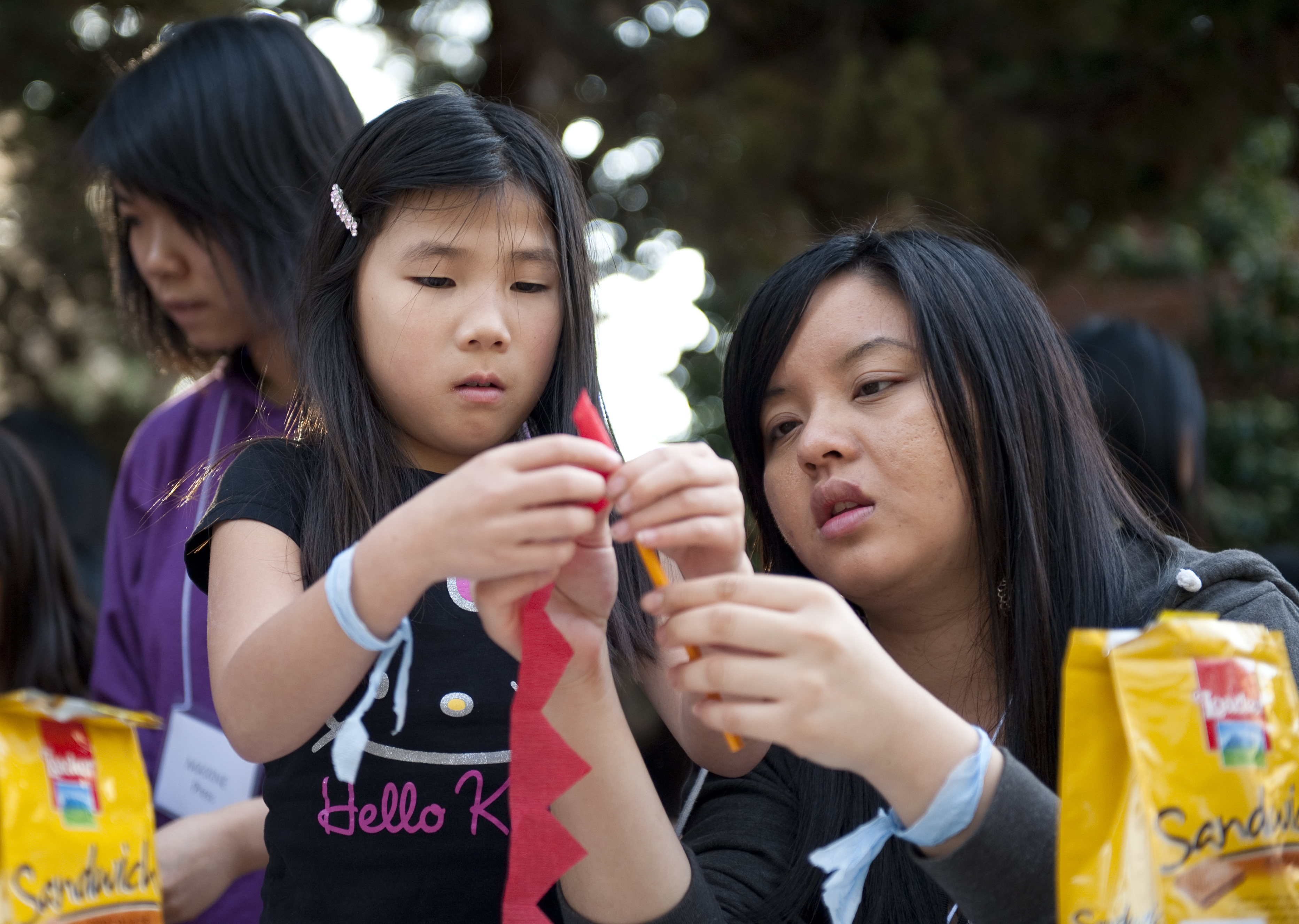Students in UCLA's China Care Bruins play 'Big Buddy' role for adoptees

Eight-year-old Julia Wallace of Los Angeles works on an arts and crafts project with her “big buddy,” fourth-year English student Catherine Chiang. Chiang mentors Wallace as a member of China Care Bruins, a student organization that connects UCLA students with children adopted from China.

Members of China Care Bruins stand with their “Little Buddies” for an event at UCLA on Sunday. The young students meet with their “Big Buddies” several times a quarter. On Sunday, they played Capture the Flag in Wilson Plaza.

Kim Tran hugs her “Little Buddy” at a China Care Bruins event at UCLA on Sunday.

Seven-year-old Michayla Brown of Los Angeles uses a pair of scissors during an arts and crafts project hosted by the UCLA student group China Care Bruins.
Six-year-old Ruby Knowlton held her arms up to Kim Tran, asking to be picked up.
Smiling fondly, Tran, a second-year biochemistry student, picked the young girl up, swinging her around in a circle.
From the way they interacted with one another at a mentorship event at UCLA last Sunday, Ruby and Tran could almost be mistaken for sisters. As Ruby’s “Big Buddy,” Tran has watched her grow for the past year and a half.
The two were paired together through UCLA’s China Care Bruins club, which matches UCLA students with adoptees from China who live in the Los Angeles area.
In addition, the club funds medical procedures for orphans in China and hosts awareness nights in an effort to alert the campus community to China’s large orphan population.
The branch at UCLA, which was founded in 2005, is one of the largest branches of the national China Care organization and one of the first on the West Coast.
On a national level, China Care Bruins is known for its strong mentorship program, said Katerina Coutsouradis, youth programs coordinator for the foundation.
Many of the program’s young participants belong to a minority in their schools or are the only Asian members of their families, said Melissa Chin, a fourth-year environmental science student.
She said China Care Bruins seeks to show the “Buddies,” as it calls the young partners, that there’s nothing wrong with being different.
In addition to the mentorship program, China Care regularly offers cultural awareness events.
Jeri Floyd’s adopted daughters Rachel and Jacquelyn have participated in China Care’s Buddy Program since its launch.
The Buddy Program offers a valuable sense of cultural belonging, Floyd said.
Buddies act as older siblings and offer guidance the kids’ adoptive parents might not provide, she said.
Lesley Goldberg, a 1988 UCLA alumna who graduated with a sociology degree, brought her 10-year-old adopted daughter, Reese, to the event Sunday. The two have come to the Buddy event five times over the years.
She said she appreciated that the club provides older role models for the participants.
“It makes (Reese) feel very special to have a young adult interested in her life,” Goldberg said.
Amelie Zhao said the club also seeks to instill a sense of culture in its participants, most recently holding a celebration for the Chinese New Year.
Zhao, a second-year business economics international student from Beijing, said she joined China Care because she wanted to give children a sample of Chinese culture.
When her Little Buddy, 7-year-old Leah, asked her how to pick up a marble with chopsticks, Zhao said she felt hopeful the Chinese culture was alive in its own way at UCLA.
“We get to serve as role models for kids who have no other way to access their Asian heritage,” Zhao said. “It’s important for the kids) to know about where they come from.”
After joining the program, the adoptees are strategically paired with UCLA students.
Students who speak one of the many Chinese dialects are sometimes paired with adoptees who have retained their first language so the duos can encourage each other to keep their language skills sharp.
While younger adoptees don’t show much concern over their heritage, older kids tend to ask why they don’t look like their parents or have different kinds of families, said Stephan Chiu, the club’s outreach coordinator.
Guidance from China Care mentors gives kids both a perspective on their culture and an opportunity for fun experiences, he added.
Annabel Kleess had first-hand experience on what it is like to grow up in a multi-racial household. The second-year neuroscience student was adopted from China in 1991. Growing up in places such as Washington and Jackson Hole, Wyo., Klees said she was often one of the only Asian students in her classes.
Organizations such as China Care Bruins did not exist when she was younger because she was part of the first wave of adoptions from China, Klees said.
As a result, Klees said working with China Care Bruins was a natural fit for her because she would be able to mentor kids, such as her Buddy, 13-year-old Hanna Goldstone, who are going through the same things as she went through.
Aside from being role models for the children, mentors such as Klees and Tran said one of their favorite parts of the club was watching their Buddies grow and mature. The mentors see their Buddies a few times a quarter.
Tran said Ruby has grown and become much less shy in the time they have been paired together.
During Ruby’s first event, the young girl refused to leave her mother’s side. As the year progressed, however, Ruby became increasingly comfortable with her Big Buddy and began to make friends within the group.
“It was rewarding to see her get out of her comfort zone,” Tran said.


